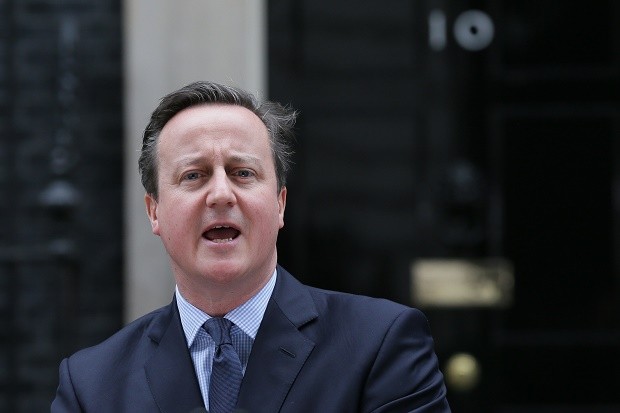Cameron: Britain’s referendum on EU membership to be June 23

British Prime Minister David Cameron makes a statement outside 10 Downing Street in London, Saturday Feb. 20, 2016. Cameron said Saturday a historic referendum on whether to stay in the European Union will be held on June 23. He spoke after winning his Cabinet’’s agreement to recommend that Britain remain part of the 28-nation bloc rather than strike out on its own. AP
LONDON, United Kingdom — It’s been three years in the making, but a June 23 date has finally been set for the momentous “in or out” British vote on whether to abandon the 28-nation European Union.
Prime Minister David Cameron vowed Saturday to lead the charge to keep Britain part of the EU, winning the backing of most of his Cabinet and support for his “stay in” goal from political heavyweights in rival parties, including the opposition Labor Party and the Scottish National Party.
READ: EU leaders agree on ‘Brexit’ deal—Lithuania president
“I do not love Brussels, I love Britain,” Cameron told the nation in front of his 10 Downing Street residence. He went on to say that he has concluded Britain would be safer and stronger remaining in the bloc, and that jobs would be created by maintaining open trading ties with Europe.
He said a landmark deal reached the day before with EU leaders in Brussels would give Britain more control over its future, lessen welfare payments to migrants who come to Britain, and protect Britain from being absorbed into a feared European “superstate.”
Article continues after this advertisementCameron said he was making good on a 2013 commitment to give British voters a chance to decide whether to remain in the bloc, which is seen by some Britons as meddlesome, overly bureaucratic, and unable to control its borders.
Article continues after this advertisementBritain has always remained somewhat apart from the European project, preferring to keep its own currency rather than adopt the euro and declining to join the passport-free Schengen zone in place in much of Europe.
READ: ‘Brexit,’ migrants endanger EU — European chief
The June vote will come as the EU struggles to cope with a sustained immigration crisis that last year brought more than 1 million people fleeing war and poverty to its shores.
The referendum battle pits those who believe Britain is better off in a formal union with Germany, France and other countries against those who see Britain as a proud island nation better capable of managing its affairs on its own.
Treasury chief George Osborne and Home Secretary Theresa May, two senior Cabinet officials seen as possible future leaders of Cameron’s Conservative Party, voiced support for continued membership Saturday. May said Britain’s “protection against crime and terrorism” is enhanced by its role in the EU.
READ: UK’s Cameron appeals to Germany to help avoid ‘Brexit’
Early polls suggest a close vote is likely, fueled by the anti-EU sentiment that has been a constant issue in British politics for decades as the Brussels-based EU bureaucracy has grown in power and usurped some roles that were formerly in the hands of individual member states.
Much of the opposition to EU membership comes from the UK Independence Party led by Nigel Farage and from skeptical members of Cameron’s own party.
The “out” campaign does not yet have a clear leader, although Farage is expected to play a prominent role. He has built his career on opposition to EU membership, but he has been unable to expand his political base and his bid for a seat in Parliament failed in the 2015 election.
London’s popular and influential mayor, Boris Johnson, has not yet declared his intentions. Some believe Johnson, a Conservative, is potentially the charismatic leader the “out” side so far lacks.
Justice Secretary Michael Gove on Saturday became the most prominent Cabinet figure to break ranks.
“By leaving the EU we can take control. Indeed, we can show the rest of Europe the way to flourish,” he said.
That drew immediate praise from Rupert Murdoch, who controls one of Britain’s major television news operations as well as several key newspapers.
“Congratulations Michael Gove,” Murdoch tweeted. “Friends always knew his principles would overcome his personal friendships.”
The outcome of the referendum is expected to influence whether Scottish political leaders, who strongly favor continued ties with Europe, seek a second referendum on whether to leave the United Kingdom.
A 2014 referendum on that question saw Scottish voters reject independence after Cameron and the leaders of the Labor Party and Liberal Democrats joined forces to convince Scottish voters that breaking away would be too risky.
The upcoming referendum may see a similar dynamic, with Cameron, Labor leader Jeremy Corbyn and Scottish National Party leader Nicola Sturgeon all arguing from different perspectives that EU membership is vital for Britain.
“It’s important that the campaign to remain in the EU learns the lessons of Scotland’s independence referendum, so that it does not lapse into scaremongering and fear,” Sturgeon said, vowing that her party would make a “positive case” for staying in the EU.
Most business leaders also strongly back EU membership because it greatly eases trade with European countries. President Obama has also indicated that the trans-Atlantic alliance is stronger with Britain remaining in the EU.
The deal Cameron agreed upon Friday with 27 other EU leaders protects Britain from taking part in an “ever closer union” with European nations and makes clear that Britain will not adopt the euro currency shared by 19 EU nations. Cameron says it also protects British interests and restricts British welfare payments to migrants from other EU nations.